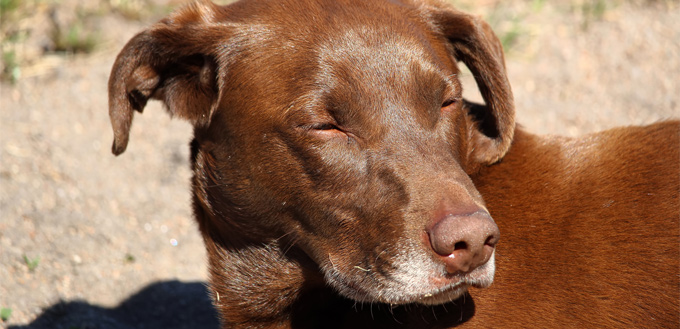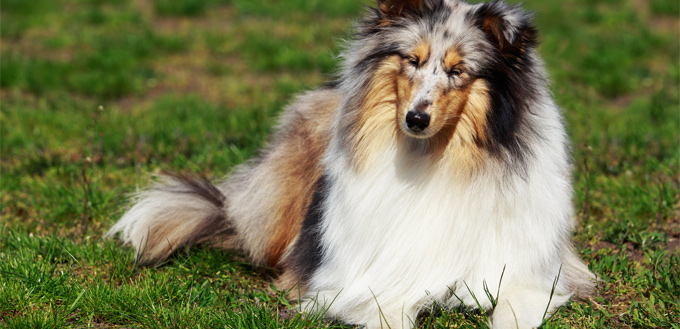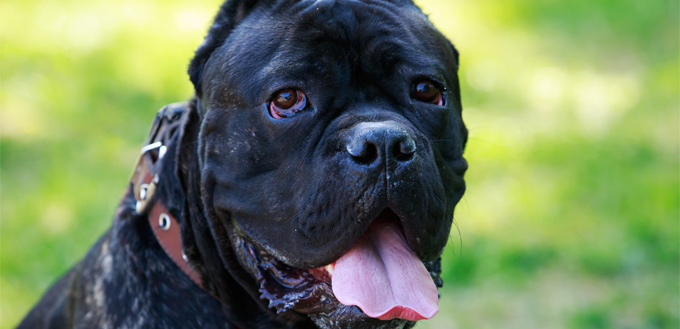Facial swelling is one of the more alarming health problems your dog might experience. There you were, having a lovely relaxing Sunday walk when your dog runs towards you with a face as puffed up like a cloud. As with many health issues, the causes can vary. Sometimes it is nothing to worry about, and sometimes you should act as quickly as possible. If you ever have any doubts, it is always better to nip to the vet, you may just save your best friend’s life!
So What Might be Causing the Swelling?
Facial swelling is a complex issue because there are so many possible causes. Some are worse than others, but a key concern to look out for is if the swelling is affecting their breathing. Regardless of the cause, this will make the problem extremely urgent, so you should get them to a vet as soon as you can.
Possible causes of facial swelling include allergies, abscesses, tumours, dental problems, cellulitis, and craniomandibular osteopathy. In this blog post, I am going to go through these possible causes, including their additional symptoms, so you can help your dog as much as you can should they need it.

Remember: your vet knows best. You shouldn’t use this advice to make your own diagnosis and treatment, but to make yourself aware of what to look out for to report back to the vet in order to make the diagnosis as smooth and efficient as possible.
Remember to jot down exactly what you think they were doing before their face swelled in order to tell your vet, as well as general notes on their lifestyle. Have they been in a forest before? How do they like to behave on walks? Have you been on holiday with them recently? Or did you leave them in a kennel?
Allergies
As one of the more common causes of facial swelling, many owners naturally assume that their dog’s facial swelling is a result of allergies. Allergic reactions are likely to cause a sudden inflammation of the face, so if your dog is fine one minute, but puffy the next, it is probable that it is due to an unknown allergy.
Related Post: Best Dog Food for Allergies
Note down anything unusual they came into contact within the last hour or two. Have they eaten anything they have never tried before? Been to a particular forest? Or are they on a new medication? Just as with humans, there are a huge number of things that dogs may be allergic to, such as:
- Bee stings or insect bites
- Vaccines
- Medication
- Foods
- Plants
An allergy occurs when your dog’s immune system responds negatively to a certain substance. Some allergies are more severe than others, so if this is a new, or unknown, allergy it is always better to visit the vet to make sure there is nothing worse going on. In the meantime, cold compresses could be used to try and slow and cool the inflammation.
Other Symptoms of Allergies
Unfortunately, this is just one of the causes of facial swelling, so if you think your dog might be having an allergic reaction, you should compare their symptoms to this list of other symptoms that often accompany an allergic reaction:
- Throat swelling
- Purple or Blue gums
- Passing out
These symptoms probably mean your dog’s airways are trapped, so they aren’t getting enough oxygen. As you probably are aware, this is extremely dangerous, so if you think you see even the smallest hint of blue in your dog’s gums – get him to the vet!
Allergic reactions might also mean that your dog is experiencing:
Many of these are also symptoms of anaphylaxis, which is an extremely dangerous reaction to an allergy that can result in a sudden fatality. If this is the case, time is of the essence and you must rush them to a vet immediately. Luckily, early treatment can often mean a full recovery.
Abscesses
Abscesses occur when pus builds up within a swollen area. They are indicative of an infected animal bite or another wound. They are another form of swelling that is likely to occur quite suddenly. Although you might not have seen the event in question, if your dog was in a position to be bitten or wounded, such as playing out of sight in the woods, and then has an inflamed face, it is more likely to be an abscess or allergy. Try looking for a wound in order to ascertain which of the two it could be.
Abscesses also require urgent attention, but shouldn’t be anything worth panicking about, provided you get help. Your vet may give your dog an anti-inflammatory or antibiotics to fight the infection, and it may also be necessary to have surgery to remove the abscess itself.

Other Symptoms of Abscesses
If you are concerned that your dog has been bitten or wounded and are now they are suffering from abscesses, you should check to see if there is any:
- Redness
- Warmth
- Feeling of fluid
- Fever
- Lopsidedness to the swelling
- Pain, such as your dog refusing to eat and drink because of discomfort
- Lethargy
- Attempts to lick the wound
- A bad smell, particularly if left untreated
Tumours
Despite what people believe, tumours are simply uncontrollable growths of cells in the body, which do not necessarily have to be cancerous. Mouth, throat and eye socket tumours could all explain facial swelling. A good question to ask yourself is ‘How long did it take for their face to swell?’. Just as abscesses and allergies cause sudden inflammation, tumours are likely to cause gradual swelling. Was your dog’s face slightly puffy this morning? Or the day before? Maybe a friend of yours thought their face looked a bit different last week? Think back so that you can give the best information to your vet.
Regardless of whether they are benign or malignant growths, the tumour needs to be removed. Especially as cancer is the leading cause of death in dogs. The sooner, the better. This will require surgery, or maybe even radiotherapy.
Take a look at our article on Signs of a Dog Dying.
Other Symptoms of Tumours
To better understand your dog’s condition, here are some alternative symptoms of Tumours to help you to assess what kind of help your dog is likely to need:
- Problems Eating
- Bleeding
- Strong odours
- Persistent wounds
- Eye discharge
- Unexpected Bloody Noses
- Lethargy, such as sudden lack of interest in a favourite toy
- Swelling specific to the eye area, which is indicative of a tumour in the eye socket which dogs are occasionally prone to.
Dental Problems
Swelling can also occur due to problems with your dog’s teeth. This might be a result of gum disease, or infected or fractured teeth. As always, you should visit your vet. They are likely to pass you to a dental specialist who will take out the infected tooth, and then give them antibiotics to deal with any infection.
Generally, you should try to become familiar with your pooch’s mouth so that you notice any changes as soon as possible. This might mean using toothbrush time as a chance to regularly inspect their mouth. Dental problems can be particularly difficult to detect because dogs have evolved not to show weakness, such as pain, and most other early symptoms are hidden in their mouths. This makes inspection vital.
Other Symptoms of Dental Problems
Early symptoms might be difficult to notice, but if the problem has already caused your dog’s face to swell, then you should watch out for these additional symptoms in order to help your vet diagnose the problem:
- Abscesses, particularly around the mouth or jaw
- Fever
- Depression
- Not Eating
- Pain
- Bad breath
- Bleeding gums
- Vocalising when they yawn or eat, when they didn’t before
- Loose teeth
- Head shyness

Cellulitis
Cellulitis is a bacterial infection that can occur if the skin is broken. This can even happen to dry skin that cracks. This particular infection penetrates deep into the skin. This is a less common cause of facial swelling but can cause it none-the-less. Unlike humans, cellulitis is more likely to occur in your dog’s body than their face. Your vet may need to take a blood sample from your dog in order to ascertain the form of infection that they have.
Like many infections, there are a few things that your vet can try to help your dog to heal. They will probably soak the wound and use antiseptics to clean it and use painkillers and antibiotics to deal with the symptoms and fight the infection. If you follow the proper medical routine, through daily cleaning and treatment of the wound, your dog should make a full recovery.
Other Symptoms of Cellulitis
Cellulitis can also occur in humans, but the symptoms can vary. You should watch out for:
- Ulcers
- Tenderness
- Redness
- Pain
- Accumulation of pus
- Warmth around the infected area
Craniomandibular Osteopathy
Another relatively rare cause of facial swelling is a condition called Craniomandibular osteopathy. This is usually only found in certain breeds. These breeds include Great Danes, Doberman Pinschers, Labrador Retrievers, some Terriers, and Boxers. It occurs predominately in dogs aged 3 to 10 months and is a bone disease in which the bones in the face suffer from irregular enlargements throughout development.
This condition can cause jaw swelling and has no cure. This doesn’t mean that your vet can’t do anything. They can offer a non-steroidal anti-inflammatory drug to help your dog to handle the pain. The condition often stabilises at around one year of age; although you should always keep an eye out for difficulties moving the jaw that may persist.
Other Symptoms of Craniomandibular Osteopathy
CMO, as it is often known, is a condition, rather than an illness, but your pet’s pain and discomfort can still be dealt with once it is diagnosed. If you are concerned that your pet has CMO, the other symptoms that you should watch out for are:
- Drooling
- Fever which can fluctuate, possibly on a 10 to 14-day cycle
- Reluctance to eat
- Pain, particularly related to using the jaw
- Depression
- A physical inability to open the mouth
Understanding the Symptoms
It is important to carefully consider all the options, but if in doubt, go to a vet. Any suspicions that they are struggling to breathe, that they have had the infection for a while, or that they could be going into anaphylaxis should make visiting the vet an urgent priority. You can’t know everything, so a professional opinion is always best. They may need to collect fluid, take an x-ray, and are likely to require faecal, urine or blood samples as well.
Treatments vary as there are so many possible causes, but be prepared to give your pet medication daily, such as antibiotics or antihistamines. In severe cases, your pet may need to be hospitalised, particularly if the swelling is affecting their breathing. Try not to worry too much if this happens, often it is a 24-hour precaution to keep an eye on them. You may also need to go to a dental specialist.

Keeping Your Dog Safe
Ultimately, treatment is very possible and recovery is usually relatively easy after the initial scare, depending on the cause of the swelling. The key is quick intervention and future prevention. So, last of all, here are some tips to help you avoid facial swelling in the future:
- Avoid contact with wild, unknown animals
- Avoid hard bones
- Supervise Play
- Check for allergies with a vet
- Prevent exposure to any allergens
- Examine your dog’s mouth once a month for tumours. Look out for swellings, growth, or bad smells.
Sources
- Amy Flowers, DVM, Dog Facial Swelling: Causes and Treatment, Pets WebMD
- Swollen Face in Dogs, Wag Walking
- Dr. Jenna Ashton, My Dog Just Came Inside and Her Eyelids and Muzzle Are Swollen. What’s Going On?, Vet Street
- Allergic Shock in Dogs, PetMD






